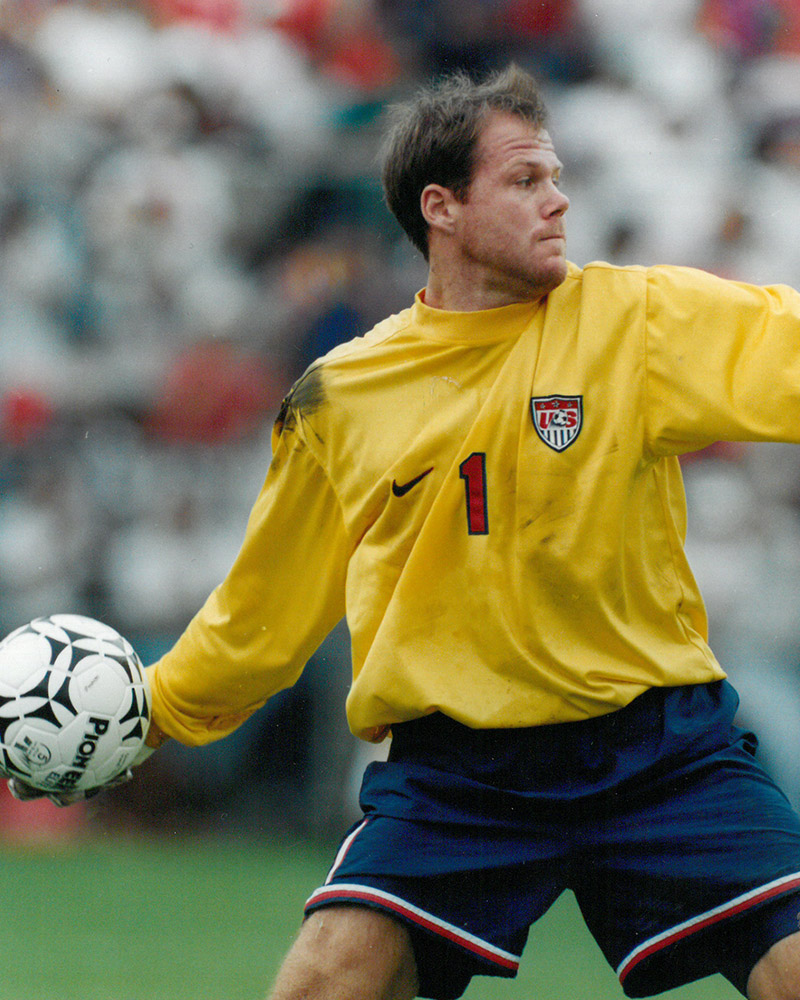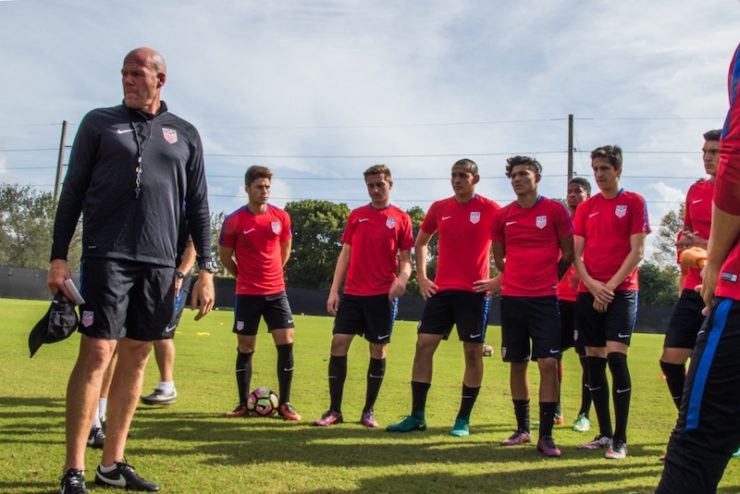MLS is Serious, Player Development Requires Great Competition & Making Time to Give Back
Doing Good In The Soccer World Series
Allstate has teamed up with Brad Friedel to hold a youth clinic ahead of the 2018 MLS Cup match. Little do the players know, ahead of the clinic their local Allstate agent and Friedel will surprise them with brand new soccer gear, and then the soccer legend will lead a skills clinic.
Friedel, the Head Coach for MLS’ New England Revolution and a member of the National Soccer Hall of Fame always tries to find time to give back to the community.
Friedel played the beautiful game professionally for an amazing 23 years and single-handedly raised the bar on goalkeeping. A fixture at the highest level, Friedel played in the MLS, English Premier League, Turkey and proudly wore the crest of the U.S. Men’s National team for 13 years (1992-2005).

In the EPL, Friedel protected the net of the Blackburn Rovers, Aston Villa, and Tottenham Hotspur. The former UCLA Bruin who earned the Hermann Trophy in 1992 hung up his pro cleats as the second-most capped goalkeeper in U.S. history. Friedel took up coaching — and was the U.S. U-19 Men’s coach for 2016-17 season.
Diane Scavuzzo: What are you doing with Allstate?
Brad Friedel: I’ve worked with Allstate for a few years now — mostly on community events, which is why I always if I have the time, jump at the opportunity to work with Allstate.
We’re also going to a school here in an underprivileged area, and putting on a clinic and donating soccer equipment and uniforms to the kids. Then, we’re going to surprise them with tickets to the MLS Cup Final Atlanta United vs Portland Timbers.
Diane Scavuzzo: Awesome. Tell me, in your words, what do you think a company like Allstate accomplishes within the soccer community by these contributions?
Brad Friedel: Sports has an incredible influence on kids. You don’t have to become a professional player to become influenced by the good the sport can do, and companies like Allstate, when they put their resources towards programs that focus on kids — it helps tremendously.
Diane Scavuzzo: Soccer is growing significantly in America. It seems like the MLS is now reaching a new level of seriousness, commitment, and respectability. What are your thoughts?
Brad Friedel: I think you hit the nail on the head with the word seriousness. Without a doubt, I think there’s a very large concerted effort to grow this league. If you look at all sports around the world, in all the different countries, MLS has to be up there will the fastest growing. We’re at 24 teams now. I think the television companies and the sponsors are willing to back it. I know the fans definitely want to back it, and the owners obviously will spend their money prudently as we go forward.
It’s an exciting time to be involved in MLS.
Diane Scavuzzo: Regarding player development within the DA and the MLS, what are your thoughts of the MLS youth teams playing each other?
Brad Friedel: I think it’s a needed necessity as we grow the game.
Whenever you can get the best playing with and against the best competition — that’s what is needed for youth development.
But you also have to understand the monetary component, if the MLS teams are playing MLS teams, for instance, somebody has to pay for travel, pay for the hotels, pay for the referees, pay for the tournaments, pay for everything.

Diane Scavuzzo: There’s a sense that MLS clubs really would like to keep their potential homegrown players at home — as opposed to having them train in Europe where there is a strong immersion into a soccer culture that we really can’t provide here. What are your thoughts on youth players training in Europe?
Brad Friedel: Well, I would disagree on that we can’t provide the environment because we can.
This is something that gets better every year. It just depends on the individual club and the people they hire. But this is something that definitely can be created here.
Sending a player over to train for a week or two weeks is not going to get them submerged into that culture.
If somebody signs a contract and is there for a year or two, that does. But, sending a player over just to train for a couple of weeks or go on a trial, that doesn’t really excite me at all.
I can only speak for our club’s — but the training component and what we do on a day-to-day basis, in the long-term, far outweighs somebody going and training at a club in Europe for a week.
I think there’s a little bit of a misconception about what training for a week or two overseas would do for somebody. I think there’s a perception/reality difference in that, and this is coming from someone, obviously, who lived and played over there for many years.
Diane Scavuzzo: What advice would you give a young player?
Brad Friedel: You have to have a smile on your face, and you have to practice, practice, practice.
There are certain ages where winning is not important, but if you’re in the professional academy system and you are 13 or 14-years-old, winning starts to become really important.
We’re looking at the kids, by the time they’re 16 and 17-years-old, to see who we’re going to sign professionally.
We want to know if the player has the ability to help the team win.
We find a lot of the American players are game seasoned before they have developed their individual technical ability. Players are taught at a very young age how to play in games, but they’re not taught at a very young age how to control the ball.
Diane Scavuzzo: Best advice?
Brad Friedel: You practice and you have fun, and you see where the game will take you.
There’s no substitution for hard work. There really isn’t.
All the very best players, all the most skillful players in the world, they all have worked hard in their lives and in their childhoods.
You have to practice and you have to enjoy what you’re doing. If you don’t have those two elements, it’ll be very hard to become a pro.
READ: BRAD FRIEDEL ON GROWING SOCCER IN THE USA
Diane Scavuzzo: As a former goalkeeper who is now a head coach, what vision do you think you have that other people don’t?
Brad Friedel: Being a goalkeeper puts you in a very good advantage point to become a coach.
I always found being a goalkeeper provides a good perspective on understanding the game and on becoming a leader — and learning how to communicate with people.
I most definitely have seen many good runs from strikers, and I know where I would want my defenders to be to try to stop that.
Diane Scavuzzo: Are today’s younger players really getting enough minutes to be able to mature and become a great homegrown talent?
Brad Friedel: Well, I think what a lot of people see are those minutes just with the first team. You know, a lot of the homegrown players that get signed will also be playing in the USL.
At most top-tier first division clubs, the young players coming through will have to play reserve games or will go and play on loan with other clubs to get minutes —before they’re ready for the first team.
Diane Scavuzzo: What are your plans for next season?
Brad Friedel: So, we obviously have the year under our belt, and I think the biggest advantage that we have is we know exactly what the players’ mentality, strengths, and weaknesses, are, that we have currently under the books.
We know which players we want to take forward with us into next season. We know the budgets that we have been given, and we are underway already with getting deals done for the players that are staying with us, and also the new ones that we want to bring in.
We’re very excited about the start of the season. I wish it was happening tomorrow, and we’ll be prepared. I think we’ll put ourselves in a really good position to be very competitive and successful next season.
Diane Scavuzzo: And, one last questions. What do you think of the Columbus Crew SC Head Coach and FIFA World Cup veteran Gregg Berhalter as the new head coach of the U.S. Men’s National Team?
Brad Friedel: I’ve known Gregg for a long time. Played with him with the national teams. Played, and obviously, coached against him with Columbus. He’s a very intense figure, has a very good soccer mind. The Columbus teams that he got together was very difficult to play against. It is a distinct style of play.
He’s going to have an ally over at New England. We wish him the very, very best of luck and any help that we can give him, we will surely try to provide it for him.





